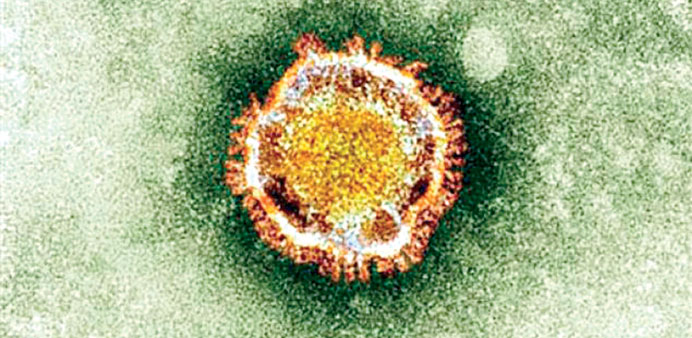|
|
A 59-year-old Qatari man has been diagnosed with the Middle East Respiratory Syndrome Coronavirus (Mers-CoV), the Supreme Council of Health (SCH) announced yesterday.
The latest case brings to three the number of people affected by the virus in Qatar.
In June, a 49-year-old Qatari man, who was the first to be diagnosed with the virus, died in a London hospital after being admitted there since last September.
The second case is responding to treatment and doing well, according to SCH.
The newly-infected man was reported to have felt the symptoms while abroad and was checked up on arrival in Qatar. He was diagnosed with the disease following tests conducted at the National Influenza Laboratory, SCH said in a statement.
The health council stressed that the patient was receiving “appropriate” medical treatment and “he is now in a stable condition” .
It also emphasised that surveillance and monitoring procedures were being strictly followed and prompt measures taken for the infection control of all cases of acute respiratory infections, especially those coming back from abroad.
The SCH statement said all samples of suspected Mers-CoV cases were being examined at the National Influenza Laboratory in co-ordination with Hamad Medical Corporation.
Speaking to Gulf Times on the sidelines of an event held in Doha yesterday, the SCH Health Protection and Communicable Diseases section manager Dr Mohamed al-Hajri claimed that the council was now in a far better position to deal with the threat of infection from the virus. “We have ample information in dealing with the virus,” he said.
“We now have more information that Mers-CoV is a minor disease when found in young healthy individuals and may only be severe for the immuno-compromised individuals such as those with chronic diseases and low immunity,” he said.
The official maintained that even if there were newly identified cases here, the health authorities were more comfortable than before in handling such cases.
“We now understand the mode of transmission of the disease and some of the mechanism of the infection and how to prevent it by isolation and quarantine. And young healthy individuals know that in case of infection, we are well-equipped to treat the case and there is no need to be afraid of the disease itself,” he said.
Dr al-Hajri claimed that the Coronavirus infection was now milder than the initial cases which had affected severely immuno-compromised persons and those with chronic diseases .
“Now, though there are more cases reported worldwide, the mortality rate is decreasing…it used to be about 50-60%; now it is below 40% . Worldwide there are around 150 cases,” he said.
“However, we are yet to identify the source of the virus,” he said.
“The number of infections has been increasing from the beginning of this year and we still expect further increase in 2014,” he added.
In Saudi Arabia, the Mers-CoV was first detected among animals in 2011.
A Saudi doctor had detected it in co-operation with a Dutch research centre, according to Dr al-Hajri.
Globally, from September 2012 until August 1, the World Health Organisation has been informed of a total of 94 laboratory-confirmed cases of infection with Mers-CoV, including 46 deaths, WHO says on its website.
Some researchers recently pointed to the Arabian camel as a possible host of the Mers virus plaguing the Middle East.
The exact origins of the virus is a riddle scientists have been working hard to solve in a bid to halt its spread, especially in the lead-up to the annual Haj pilgrimage to Saudi Arabia in October.
An international team earlier this month said blood tests were positive for antibodies in camels from Oman, meaning they had at some point been infected with Mers-CoV or a closely-related virus.
The findings suggest that Arabian or dromedary camels “may be one reservoir of the virus that is causing Mers in humans”, said a statement that accompanied the study published in The Lancet Infectious Diseases journal.
Mers has killed 46 of the 94 people confirmed infected since September last year, according to the World Health Organisation (WHO).
Concerns about the virus, for which there is no vaccine, have led Saudi Arabia to restrict visas for the 2013 Haj.
Scientists had long suspected that like its cousin virus Sars, which killed hundreds of people in Asia 10 years ago, Mers may originate in bats.

